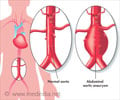Screening for aortic aneurysms in older men needs a rethink, finds study. Aortic aneurysms in the abdomen, or abdominal aortic aneurysms, are a localized enlargement of the aorta.

Aortic aneurysms in the abdomen, or abdominal aortic aneurysms, are a localized enlargement of the aorta. The condition mainly affects older men, is strongly linked to smoking, but there usually are no symptoms. If the artery ruptures, however, the mortality rate is more than 80 percent.
The purpose of screening is to find the aneurysms before symptoms and thereby enable preventive surgery. On the downside, screening finds aortic aneurysms that never would have ruptured or caused symptoms even if they remained undetected. This means that screening leads some men to undergo a surgery that will not benefit them but that poses a risk of serious complications and even death. In addition, the diagnosis can lead to anxiety, described by patients as "living with a ticking time bomb in the stomach."
In the current study, information on 25,265 older men who were screened was compared with an age-matched control group of 106,087 men who had not been screened. It was possible to compare contemporaneous groups of screened and non-screened men because the screening program was introduced in Swedish administrative regions in stages during the 2006-2015 period.
The researchers also studied the incidence and mortality from abdominal aortic aneurysms among all Swedish men between the ages of 40 and 99 from 1987 to 2015. It was already known that the disease decreased during the period, but the role screening played was not known.
"Mortality has declined by over 70 percent, and this trend was seen in both screened and unscreened counties and in both screened and unscreened age groups," Minna Johansson says. "If the screening program had any impact at all on the decline, it was very small. This very positive reduction in mortality was probably due to a decline in smoking".
Advertisement
The decreasing mortality of the disease for reasons other than screening has led to growing problems with over-diagnosing and over-treatment. Therefore, the balance between the benefits and harms has changed for the worse, the study shows. Of 10,000 men summoned for screening, at best two will have avoided death from abdominal aortic aneurysms after six years.
Advertisement
An alternative to current screening, to which over 80 percent of all older men in Sweden attend, may be to screen only men at high risk, such as current and former heavy smokers and people in families with a history of the disease. Another option is to focus more on reducing smoking in the population in general, which would also lead to many other important health benefits. Minna Johanson and her co-authors anticipate continued discussion on the issue.
"This is a difficult ethical dilemma. It's important that the men who are summoned for screening are informed that there are serious risks arising from participation and that the chance to benefit is at best very small today. We came to the conclusion that it is doubtful that the benefits of screening outweigh the harms and that the Swedish screening program should therefore be revisited," says Minna Johansson.
Source-Eurekalert









